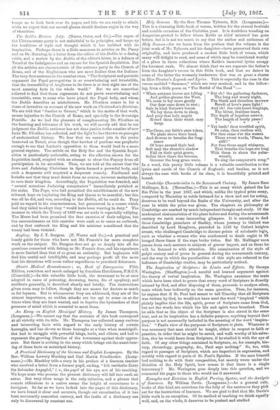The _Inspiration of Scripture: its Limits and Effects. By George
Warington. (Skeffington.)—A careful and learned argument against
the theory of verbal inspiration. Mr. Warington examines the texts which have been cited to prove that every word of Scripture is directly uttered by God, and after disposing of them, proceeds to analyze other, texts which bear indirectly on the same question. Thus, for instance, he argues that if St. Paul had meant to tell Timothy that all Scripture was written by God, he would not have used the word "inspired" which plainly implies that the life, spirit, power of Scripture came from God, but not the words into which the life and. spirit were breathed. Then he adds that as the object of the Scripture is also stated in the same text, and as its inspiration has a definite purpose, anything beyond that purpose is not necessarily included in the meaning of the word inspira- tion.' "Paul's view of the purposes of Scripture is plain. Whatever it was necessary that man should be taught, either in respect to faith or
practice, in order that he might be saved, and walk worthy of his salva- tion, that he would learn from Scripture, if he studied it with the eye of
faith. Of any other things contained in Scripture, as, for example, his-
tory, chronology, geography, he., Paul says nothing." So, too, with regard to passages of Scripture, which are imperfect in expression, and
notably with regard to parts of St. Paul's Epistles. If the man himself had nothing to do with their composition, but merely wrote under the dictation of the Holy Spirit, how comes it that there is a single inaccuracy? Mr. Warington goes deeply into this question, and we commend his pages to those who would see it answered.






























 Previous page
Previous page